SWEDISH SOUTH ASIAN STUDIES NETWORK
Department of Biotechnology, Center for Chemistry and Chemical Engineering, Faculty of Engineering, Lund University
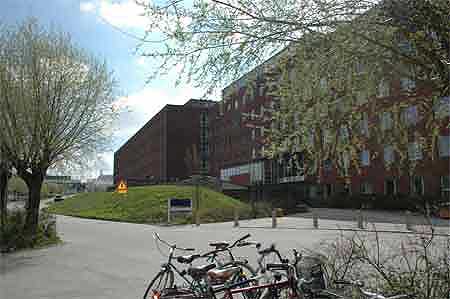 Postal
address: Box 124, SE-221 00 Lund, Sweden
Postal
address: Box 124, SE-221 00 Lund, Sweden
Visiting address: Getingevägen 60
Web page: http://www.biotek.lu.se/
Contact persons:
•Professor Rajni
Hatti Kaul, Head of department, phone: +46 (0)46 2224840. Personal web page. CV.
• Professor Bo Mattiasson,
phone +46 (0)46 2228264
Research connected to South Asia
The research activities at the Department of Biotechnology
cover various topics within the areas of environmental-, analytical-,
food- and process biotechnology.
Biological treatment of contaminated soil and biogas production are two
areas with a growing importance that have been focused on during the last
ten years. Development of biosensors and methods for process control of
biotechnological processes is another important area. The field of research
activities also includes isolation, cultivation and purification of biomolecules
from microorganisms, with special emphasis on enzymes from microorganisms
living in extreme environments e g thermophiles, alkaliphiles and psychrophiles.
Such enzymes have special characteristics which make them useful under
a broad range of process conditions.
The use of enzymes or whole cells as catalysts for production of a variety
of substances is studied involving biocatalysis in both organic and aqueous
media. New and rational methods for protein purification are being developed
mainly focusing on affinity precipitation, using reversibly soluble-insoluble
polymers as ligand carriers, aqueous two-phase extraction and expanded
bed adsorption.
In 2003, the department received a major grant from MISTRA (Stiftelsen
för Miljöstrategisk Forskning) for research on sustainable
technology. SEK 34 Million was awarded for a 3.5 years research program
called ”GREENCHEM”.
Greenchem is a research program aimed at using modern biotechnology for
production of biodegradable chemicals from renewable resources, and will
use biotechnology to produce biosurfactants for use in pharmaceutical
preparations, personal care products, concrete and other products; wax
esters for surface coatings; and epoxides for surface coatings and starting
material for different products. In 2007, the project went into its second phase, and another SEK 37.5 million was granted by MISTRA. The project was completed in 2010, and a final conference held in November 2010. More
information on the Greenchem project.
Specific interests include biotechnology for a sustainable development and biotechnology for developing countries, which is clear from the many previous and ongoing collaborations the department has with such countries. A few years ago it was estimated that the department collaborated with universities, institutes and companies in more than 35 countries worldwide.
Professors Bo Mattiasson and Rajni Hatti Kaul have both worked on several
projects connected to South Asia.
The collaboration partners in India
are: The Indian Institutes of Technology (IIT)
in Delhi and Kanpur; Agharkar
Research Institute in Pune; Bhabha
Atomic Research Centre in Mumbai;
University of Mumbai; University
of Calcutta in Kolkata; and the Central
Food Technology Research Institute in Mysore.
In Sri Lanka collaboration has been initiated with the University
of Jaffna.
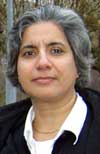 Professor Rajni Hatti-Kaul has a background from India. She obtained her PhD degree in Biochemistry from the University of Bombay in 1984. After a post-doctoral period at Lund University (1985-87) she served as research assistant at Astra Research Centre India in Bangalore 1988-90, wherafter she returned to Lund University, and became a Associate professor in 1997, and Professor of Biotechnology in 2004.
Professor Rajni Hatti-Kaul has a background from India. She obtained her PhD degree in Biochemistry from the University of Bombay in 1984. After a post-doctoral period at Lund University (1985-87) she served as research assistant at Astra Research Centre India in Bangalore 1988-90, wherafter she returned to Lund University, and became a Associate professor in 1997, and Professor of Biotechnology in 2004.
Her research interests are in the fields of integrated bioprocessing for recovery of biomolecules from biotechnological processes, downstream processing of proteins, immobilised biocatalyst technology for bioconversations and bioanalysis, and application of enzymes from extremophilic organisms for utilization of renewable raw materials and food processing.
In October 2004, Prof. Hatti-Kaul
was given SEK 600 000 as a Swedish Research Links three-years grant (2005-07)
for a India related research project on ”Biotechnological
production of biodegradable plastics”. More
information.
Project abstract: The modern society has become increasingly
dependent on plastics that are today integrated into innumerable commodity
products ranging from packaging to furniture. The major problem associated
with the use of commodity plastics is that much of it lands up as discarded
waste on landfills once they are no longer in use. These materials persist
in the environment without getting degraded thus giving rise to a variety
of ecological and environmental problems. It has for a long time been
recognised that reducing plastic refuse could go a long way in preventing
a landfill crisis, however, the remarkable usefulness of polymers probably
precludes any serious slowdown in their applications. This problem although
prevalent worldwide, is increasing at a tremendous pace in developing
countries due to indiscriminate use of plastics as a result of their reduced
costs and easy availability.
An important step towards providing a sustainable solution to such an
environmental problem would be to reduce pollution at the source so that
emphasis is no longer on an already damaged environment. The collaborative
project between Sweden and India funded by Swedish Research Link sconcerns
development of biotechnological production of biodegradable plastics of
the type polyhydroxyalkanoate (PHA) from renewable raw materials by halophilic
bacteria or by their catalytic machinery in a recombinant host. This will
be done with a focus on developing "clean" processes and products
that have far reaching implications with regards the effective utilization
of surplus agricultural and waste resources along with the reduction in
the environmental burden. PHAs possess material properties similar to
various synthetic thermoplastics and elastomers currently in use (from
propylene to synthetic rubber), and upon disposal, they are completely
degraded to water and carbon dioxide (and methane under anaerobic conditions)
by microorganisms in various environments such as soil, sea and lake water
and sewage.
In November 2007, she was given SEK 1.0 million as a three-years grant (2008-10) from Sida's Developing Country Research Council (U-landsforskningsrådet), for a development of the project above, now titled ”Biotechnological production of biodegradable plastics from surplus biomass: combating waste accumulation in developing countries”. The collaboration partner on the Indian side has been Dr. Sandra D’Souza, Bhabha Atomic Research Centre, Mumbai. More information about the Sida grants 2007.
Prof. Hatti-Kaul was a member of the working group that
established SASNET in the year 2000, and was the Vice Chairperson in
SASNET’s board during the period 2001–2006.
Lund University’s magazine LUM published an article about Prof. Hatti-Kaul in its February 2009 issue. Read the article ”Grön bioteknik lockar finansiärer” written by the journalist Mats Nygren.
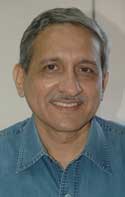 An International conference on ”Biotechnology for Sustainable Development”, was held 7–9 January 2008 in Pune, India. The conference, named BSD – 2008, was organised by the Chemical Engineering and Process Development Division at the National Chemical Laboratory (NCL) in Pune, in collaboration with the Dept. of Biotechnology, Lund University, Sweden. It was supported by the Swedish Foundation for Strategic Environmental Research (Mistra) and the Indian Council of Scientific and Industrial Research (CSIR). Dr. Sanjay Nene (photo to the right) from NCL convened the conference, that highlighted the latest developments areas such as • Biotechnology for production of green chemicals; • Biorefinery – Use of plantation crops for production of Chemicals; • Bioremediation of solid, gaseous and liquid wastes; and • Waste water treatment and recycle using clean technologies. More information in a report given in Mistra Newsletter 2/08 (in Swedish).
An International conference on ”Biotechnology for Sustainable Development”, was held 7–9 January 2008 in Pune, India. The conference, named BSD – 2008, was organised by the Chemical Engineering and Process Development Division at the National Chemical Laboratory (NCL) in Pune, in collaboration with the Dept. of Biotechnology, Lund University, Sweden. It was supported by the Swedish Foundation for Strategic Environmental Research (Mistra) and the Indian Council of Scientific and Industrial Research (CSIR). Dr. Sanjay Nene (photo to the right) from NCL convened the conference, that highlighted the latest developments areas such as • Biotechnology for production of green chemicals; • Biorefinery – Use of plantation crops for production of Chemicals; • Bioremediation of solid, gaseous and liquid wastes; and • Waste water treatment and recycle using clean technologies. More information in a report given in Mistra Newsletter 2/08 (in Swedish).
In the Fall 2010, Prof. Hatti Kaul was awarded an Erasmus Mundus Action 2 Indo-European mobility programme Lot 13 scholarship (coordinated by Lund University) as an academic staff, to spend one month at Pune University in India. More information on the programme.![]()
In October 2010, Prof. Hatti Kaul was awarded SEK 2 700 000 as a three-years research grant (2011–13) from the Swedish International Development Cooperation Agency, Sida, for a a new project entitled ”Sustainable production of bioenergy from agriculture residues – avoiding competition with food availability in developing countries”. The project is carried out in collaboration with researchers in Vietnam and Sri Lanka.
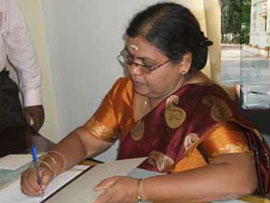 The collaborating partner in Sri Lanka is Prof. Vasanthy Arasaratnam (photo) , Dean of Faculty of Medicine, Dept of Biochemistry, University of Jaffna.
The collaborating partner in Sri Lanka is Prof. Vasanthy Arasaratnam (photo) , Dean of Faculty of Medicine, Dept of Biochemistry, University of Jaffna.
More information about the 2010 Sida grants. ![]()
Project abstract: The project concerns the production of second-generation biofuels from lignocellulosic agricultural residues, rice straw and sugarcane bagasse, produced in enormous amounts in developing countries. In order to make the optimal and economical use of the available biomass, co-production of other value-added products with biofuels will be done. Different methods for pretreatment of the lignocellulosic residues will be evaluated for separation of cellulose, hemicellulose and lignin. Cellulose degrading enzymes will be developed for hydrolysis of cellulose to glucose, which will then be fermented to ethanol. For increasing the energy yield, the fermentation residue will be subjected to anaerobic digestion for prduction of biogas. Hemicellulose will be converted by enzymatic hydrolysis to xylooligosaccharides for application as prebiotics, and also modified for use as biodegradable plastic.
In January 2011, SASNET launched an Interdisciplinary South Asia Seminar series at Lund University, in the form of Brown bag lunch seminars. The aim is to present and disseminate the eminent South Asia related research that is carried out in so many departments at Lund University.
Prof. Hatti Kaul was invited to hold the second Brown Bag seminar during the spring 2011, on Thursday 19 May. She talked about ”Biotechnology and Sustainable Development”.
More information on SASNET’s Brown Bag seminars. ![]()
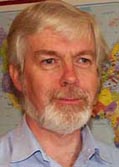 Professor Bo
Mattiasson has been working at the
Dept. of Biotechnology since it was founded in 1985, and he was the Head of the department
till 2006 (when he was succeded by Prof. Rajni Hatti-Kaul).
Professor Bo
Mattiasson has been working at the
Dept. of Biotechnology since it was founded in 1985, and he was the Head of the department
till 2006 (when he was succeded by Prof. Rajni Hatti-Kaul).
Over the years,
Bo Mattiasson has been involved in several collaboration projects involving
Indian researchers and Indian institutions.
In August
2001 he received SEK 125 000 as a SASNET planning
grant for initiating a programme on ”Environmental
Remediation and Sustainable Development”. The
project was carried out within the framework of the
Bioremediation research group, Biorem, a sub-group in the department
that gathers researchers involved in bioremediation studies. Biorem
aimed to develop cost efficient biological methods to eliminate persistent
organic pollutants (POPs) from the environment.
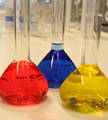 Bo Mattiasson and his dye remediation research group in Lund were the first Swedish
researcher to receive funding from the ”Facility
for Environmental Initiatives and Innovations” – an
Indo-Swedish programme set up by Sida, the Swedish International Development
Cooperation Agency, in December 2006, with an aim is to encourage knowledge
sharing and co-operation on development of new technical solutions
between India and Sweden, and to evolve best practices in the environmental
field. (more
information about the ”Facility”). The funding was given SEK 600 000 for an applied research project on biodegradable methods
to treat the waste water emanating from the textile industries in the
South Indian city of Tiruppur.
Bo Mattiasson and his dye remediation research group in Lund were the first Swedish
researcher to receive funding from the ”Facility
for Environmental Initiatives and Innovations” – an
Indo-Swedish programme set up by Sida, the Swedish International Development
Cooperation Agency, in December 2006, with an aim is to encourage knowledge
sharing and co-operation on development of new technical solutions
between India and Sweden, and to evolve best practices in the environmental
field. (more
information about the ”Facility”). The funding was given SEK 600 000 for an applied research project on biodegradable methods
to treat the waste water emanating from the textile industries in the
South Indian city of Tiruppur.
The project was entitled ”Development
of Process Technology for Treatment of Wastewaters from Greeting Knit
Wear in Tirupur, India”. More
information (as
a pdf-file)
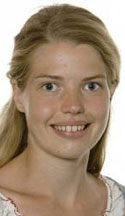 Besides Prof. Mattiasson, the researchers involved in this project were
Dr. Naresh Kumar (Indian post-doc guest researcher at the department) and
PhD candidate Maria
Jonstrup (photo to the left).
Besides Prof. Mattiasson, the researchers involved in this project were
Dr. Naresh Kumar (Indian post-doc guest researcher at the department) and
PhD candidate Maria
Jonstrup (photo to the left).
The dye remediation group (more information) continues to work on treatment of textile dyes using biological and physico-chemical techniques. The project is now entitled ”Treatment of textile dyes using biological and physiochemical techniques”. ![]()
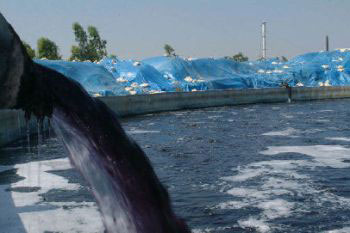 In India research has been carried out in Tirupur (photo) and in Kanpur. The project is carried out in collaboration with Indiska Magasinet AB, Sweden.
The target of the project is to deliver a viable treatment method to the textile industry for cleaner production.
In India research has been carried out in Tirupur (photo) and in Kanpur. The project is carried out in collaboration with Indiska Magasinet AB, Sweden.
The target of the project is to deliver a viable treatment method to the textile industry for cleaner production.
This project is focused on degradation of textile dyes using white-rot fungi and combining anaerobic-aerobic bacterial processes. Part of the effort is also on photocatalysis, though being a physico-chemical process it has many advantages. First a laboratory scale treatment process for synthetic wastewater will be developed. Once this is achieved the next step will be to build a pilot plant at a textile factory in India. The final goal is to be able to reuse the treated wastewater within the factory.
Abstract: In textile industries, considerable amounts of water and chemicals are used. During the dyeing process about 20% of dye is lost to the wastewater and wastewaters from textile industries usually contain large amounts of dyes as well as organic matter, salts and other substances.
Cloth has been dyed for centuries, but the environmental problems arose first after industrialization replaced traditional natural dyes by the synthetic dyes used today. Since synthetic dyes are designed to resist bleaching by UV-light and chemicals to improve the quality of the textiles, they are also persistent in the environment and some dyes can be biologically modified into carcinogenic compounds. The release of untreated wastewater poses a threat to the environment and the most serious problems are ground water and surface water pollution. Further, the discharge of colored effluents into water bodies affects the sunlight penetration which in turn decreases both the photosynthetic activity and dissolved oxygen levels.
The removal of dyes from textile wastewater is one of the major environmental challenges. Since the majority of dyes are recalcitrant to conventional biological methods the most common techniques used today are physico-chemical. However, many of these methods suffer from limitations. They are usually not cost-efficient and most of them lead to generation of hazardous waste that needs to be dealt with separately. There is thus a need for new treatment options. Promising alternatives are biological treatment methods such as white-rot fungi or sequential anaerobic-aerobic treatment, which offer inexpensive and environmentally friendly ways to treat dye containing wastewater.
In October 2007, Prof. Bo Mattiasson received a minor grant from the Swedish Research Links programme (funded by Sida and the Swedish Research Council)
for a India related project titled ”Anaerobic, thermophilic microorganisms – new biocatalysts for sustainable use of natural resources”. More information on the Swedish
Research Links grants 2007.
Then in November 2008, Prof. Mattiasson received SEK 600 000
as a three-years research grant for the period 2009–11 from the Swedish Research Links programme for the same India related project. The project is now titled ”Exploration of pristine and extreme
habitats for themophilic anaerobes and
their enzymes for industrial
applications”. The collaboration partner on the Indian side is Dr. Prashant Dhakephalkar, Agharkar
Research Insitute in Pune. More information on the Swedish
Research Links grants 2008.
In November 2009, Prof. Mattiasson was awarded SEK 600 000 as a three-years research grant (2010–12) from the Swedish International Development Cooperation Agency, Sida, for a a new project entitled ”Biotechnology research as an important tool towards sustainable development”. More information about the 2009 Sida grants.
In October 2010, he was again awarded with a grant from the Swedish International Development Cooperation Agency, Sida, this time for a project entitled ”Treatment of Virus-Polluted Water”. The project will be carried out during the period 2011–13, and the grant is SEK 2 700 000. More information about the 2010 Sida grants. ![]()
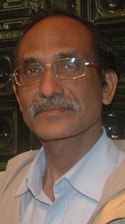 Prof. Mattiasson is also involved in a research collaboration project on Biogas with Associate Professor Virendra Kumar Vijay (photo) from the Centre for Rural Development and Technology, Indian Institute of Technology Delhi (IITD). Dr. Vijay coordinates the Biogas Development & Training Centre at IITD. He visited Lund University and the Dept. of Biotechnology in August 2010, as a member of an Indian delegation invited to Sweden by the Swedish Embassy in Delhi, and Avfall Sverige. More information about the delegation’s visit to Lund.
Prof. Mattiasson is also involved in a research collaboration project on Biogas with Associate Professor Virendra Kumar Vijay (photo) from the Centre for Rural Development and Technology, Indian Institute of Technology Delhi (IITD). Dr. Vijay coordinates the Biogas Development & Training Centre at IITD. He visited Lund University and the Dept. of Biotechnology in August 2010, as a member of an Indian delegation invited to Sweden by the Swedish Embassy in Delhi, and Avfall Sverige. More information about the delegation’s visit to Lund. ![]()
Dr Maria Andersson holds a position as Technology coordinator at the department, and is the
Deputy Head of Department. She has been involved in several international
collaboration projects. In August 2007, Dr. Anderssson recieved a SASNET planning grant to coordinate a new research networking project titled ”Sol-gel encapsulation of biomolecules – special emphasis on developing cost-effective diagnostic tests." See
the full list of SASNET planning grants 2007.
Dr. Martin Hedström, who defended
his doctoral thesis in 2006 in the field of bioanalysis, “Process analytical tools for the
monitoring and characterization of bacterial toxins”, and the PhD candidate Harald Kirsebom, were also involved in the project. The collaboration partners on the Indian side were Dr. Ashok Kumar (more information above); and Dr. S. Ganesh, Assistant Professor at the Department of Biological Sciences &
Bioengineering, Indian Institute of Technology (IIT), Kanpur, India. Just like Dr. Kumar, he has also
long experiences with the international co-operations particularly with Japan in
the area of medical sciences. The applicant’s involvement in this project was
of high relevance as he has direct contacts with the medical researchers and
hospitals in India.
Project summary: Every year millions of people die from various types of infectious. Though medical
advancements nowadays have made it possible to control most of the infectious diseases
which can be treatable, nevertheless they still impose a huge burden on morbidity and
mortality in developing countries with highest fatality in children and young adults.
The reason for this is mainly that while access to drugs has improved markedly through
various campaigns, accurate identification of patients requiring treatment still remains
an obstacle due to the lack of availability of appropriate diagnostic tests. At the eighth
annual meeting of the Global Forum for Health Research it was concluded that further
health research of high quality, focused on the needs of developing countries, including
development of affordable and accessible diagnostics, is needed. This project focused
on the technical development of cost-effective and stable diagnostic kits which can be
used for detecting infectious diseases.
The Swedish researchers visited IIT Kanpur in the fall 2008, and seminars were held with the Indian partners.
After the successful planning, the researchers have applied for grants from various sources for this project.
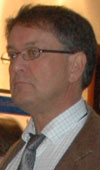 Professor Olle
Holst (photo
to the right) is in charge of the department’s International Masters programmes, that have been attractive to students
from South Asia.the programmes. In November 2006, he participated
in the SASNET
workshop on ”The role of South Asia in the
internationalisation of higher education in Sweden” held
in Stockholm, where he gave a presentation about
experiences from these Masters programmes, in the session about ”Recruitment
of South Asian students in hard sciences in Sweden”. Read
Prof. Holst’s presentation at the workshop (as a pdf-file).
Professor Olle
Holst (photo
to the right) is in charge of the department’s International Masters programmes, that have been attractive to students
from South Asia.the programmes. In November 2006, he participated
in the SASNET
workshop on ”The role of South Asia in the
internationalisation of higher education in Sweden” held
in Stockholm, where he gave a presentation about
experiences from these Masters programmes, in the session about ”Recruitment
of South Asian students in hard sciences in Sweden”. Read
Prof. Holst’s presentation at the workshop (as a pdf-file).
In the Fall 2010, Prof. Holst was awarded an Erasmus Mundus Action 2 Indo-European mobility programme Lot 13 scholarship (coordinated by Lund University) as an academic staff, to spend one month at Anand Agricultural University in Gujarat, India. More information on the programme.![]()
Previous South Asia related research
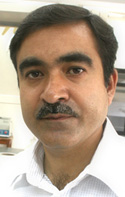 • Dr. Ashok
Kumar is an experienced Indian scientist. He obtained his PhD jointly from IIT Roorkee, and the Institute of Genomics and Integrative Biology, Delhi. Dr. Kumar carried out postdoctoral research as a as a Senior Research Scientist at the Dept. of Biotechnology, Lund University, from 1997 till 2004, when he joined the Department of Biological Sciences
and Bioengineering, Indian Institute
of Technology (IIT) in Kanpur. He is however still involved in some collaboration projects with colleagues at different departments at Lund University, and he spends some periods of the year in Sweden.
• Dr. Ashok
Kumar is an experienced Indian scientist. He obtained his PhD jointly from IIT Roorkee, and the Institute of Genomics and Integrative Biology, Delhi. Dr. Kumar carried out postdoctoral research as a as a Senior Research Scientist at the Dept. of Biotechnology, Lund University, from 1997 till 2004, when he joined the Department of Biological Sciences
and Bioengineering, Indian Institute
of Technology (IIT) in Kanpur. He is however still involved in some collaboration projects with colleagues at different departments at Lund University, and he spends some periods of the year in Sweden. ![]()
In
August 2003, Dr. Kumar received a SASNET
planning grant for a project on ”Low-cost
Protein Bioseparation Technology – A Realistic Option for the Bioindustry
of Developing Countries”.
It was a biotech research project carried out in collaboration with Associate
Professor Pradip
K Roychoudhury at the Dept.
of Biochemical Engineering &
Biotechnology, IIT Delhi. The project, dealing with industrial use of
low-cost technique and local material for important products,
was developed into a research project funded by
a Sida/SAREC three-years
Swedish Research Links grant (2004-06). The collaboration project with
IIT Delhi was now renamed into
”Development of Integrated Product
Recovery Process for Urokinase Production and Purification”.
In August 2006, Ashok Kumar received a SASNET planning
grant for a new research project on ”Cost-efficient
production of therapeutic proteins – a need for bioindustry in
developing countries." The project is intended to
develop a network with Indian academic and bio-industry partners for
developing a cost-efficient production process for antibodies. It is
a continuation of the previous project
in developing low-cost protein purification techniques which resulted
in the development of urokinase production process. More
information about SASNET planning grants 2006.
Project abstract: Following the discovery of hybridoma
technology by Köhler and Milstein in 1975, monoclonal antibodies
have had profound implications in terms of medical research, diagnosis
and therapy. Now monoclonal antibodies (MAbs) are the second largest
category of biopharmaceutical products in development. Thousands of mouse
monoclonal antibodies have been produced from hybridomas over the past
25 years. This technique can now be used to clone human antibodies from
transgenic mice. As monoclonal antibodies (MAbs) are usually given in
high doses over a long period of time, the capacity for manufacturing
these products in mammalian cell cultures will be challenge. The market
for therapeutic monoclonal antibodies is forecasted to reach nearly US$
10 billion by next year. The average annual growth rate for antibody-based
therapeutics is more than 30% and for global market of pharmaceuticals,
it is about 10%. Within the next years, the number of marketed antibody
products is expected to double. Thus, the market for antibodies has a
huge growth potential. Antibodies are one of the most important therapeutics
proteins presently being used in treatment of various health conditions
including cancer therapy. However, at present these life saving protein
drugs are not available at very affordable prices for common usage in
developing countries.
Dr. Kumar has previously
established a good network contact with IIT Delhi through the collaboration
project with Dr. Pradip K. Roychoudhury. His main research collaboration
partner at IIT Kanpur was Dr. S. Ganesh,
Assistant Professor at the Dept. of Biological Sciences & Bioengineering.
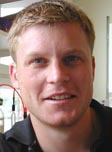 PhD Benoit Guieysse defended his docoral thesis on ”Innovative
Bioreactors for the Degradation of Polycyclic Aromatic Hydrocarbons”,
on 1 November, 2001. Read
the abstract.
PhD Benoit Guieysse defended his docoral thesis on ”Innovative
Bioreactors for the Degradation of Polycyclic Aromatic Hydrocarbons”,
on 1 November, 2001. Read
the abstract.
Till November 2006, Benoit Guieysse was Project
Coordinator of Biorem, and as project coordinator he took care of the
PhD and Masters students in the group.
Guieysse was engaged in projects on bioreactors for detoxification,
an area of utmost importance for South Asia.
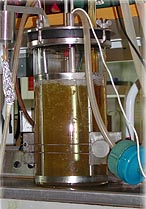 In August 2002 he was given a research planning
grant from SASNET to develop a project on ”Combined
biophysical remediation processes for the cost-efficient removal of
Persistant Organic Pollutants”, and building a network
of researchers from Sweden, Sri Lanka and India, for the development
of combined physical-biological processes for the removal of POP’s.
These pollutants, related to pesticides, cause a serious threat to
the environment and have toxic effects to humans and wildlife. The
problem is especially worrying in South Asia where land and water are
often polluted due to a lack of regulation and resources for implementation
of clean technologies and remediation processes.
In August 2002 he was given a research planning
grant from SASNET to develop a project on ”Combined
biophysical remediation processes for the cost-efficient removal of
Persistant Organic Pollutants”, and building a network
of researchers from Sweden, Sri Lanka and India, for the development
of combined physical-biological processes for the removal of POP’s.
These pollutants, related to pesticides, cause a serious threat to
the environment and have toxic effects to humans and wildlife. The
problem is especially worrying in South Asia where land and water are
often polluted due to a lack of regulation and resources for implementation
of clean technologies and remediation processes.
Guieysse established contact with Professor Vasanthy
Arasaratnam, Faculty of Medicine, Dept of Biochemistry, University of Jaffna, Sri Lanka, who was also involved in the project.
Researchers at Jaffna University are well experienced in many of the
areas of the project as well as seriously concerned about environmental
issues (due to pesticides and explosives), but communication has been
difficult because of the conflict in Sri Lanka.
Besides Jaffna University the other partners in the network included
Birla Institute of Science and Technology, BITS, in Pilani, the Bhabha
Nuclear Research Institute in Mumbai, and Jamia Hamard University in
New Delhi, all institutions Guieysse visited in the Spring 2003. A symposium
on ”North South exchange in
environmental biotechnology” was supposed to be held in August
2005, a symposium to which Arasaratnam and other participants in the
network were invited, but the symposium was cancelled.
In November 2005 Benoit Guieysse received SEK 800 000 from Sida/SAREC
as a two-years (2006-07) research grant for a project titled ”Biomonitoring
of microbial communities in waste stabilization ponds enhanced pollutant
removal”. More information
on Sida funded South Asia related research projects in 2005.
In November
2006, Dr. Guieysse however quit his job at Lund University, and joined Nanyang
Technological University in Singapore, a university that has had
a long-standing collaboration with Lund University.
Dr. Mattias
Svensson has been engaged in the research group
Agrigas (financed by the Energy Supply Committee of Southern Sweden,
DESS, and led by Bo Mattiasson.
He defended his doctoral dissertation about "The
technology and economy of farm-scale high-solids anaerobic digestion
of plant biomass" on Wednesday 14 December
2005. Faculty opponent was Professor Jukka Rintala, Dept. of
Biological and Environmental Sciences, University of Jyväskylä,
Finland. The full thesis is available on the Internet, go
for it (as a pdf-file).
The research has involved some studies on India. In
January 2003, Mattias Svensson presented
a paper on ”Agrigas – Biogas
from crop residues”
at the Development studies research conference at Lund University . Read
the abstract.
The Indian researcher Sankar
Marichamy was connected to
the department for some years. In October 2004, he received SEK 600 000
as a Swedish Research Links from Sida and the Swedish Research Council,
for an India related project titled ”Psychrophilic
anaerobes and application of their genes to recalcitrant biomass
utilization”. More
information.
Since, Dr. Marichamy has moved to the University of California in Santa
Barbara, USA.
Erasmus Mundus External Cooperation Window Programme scholarship holders
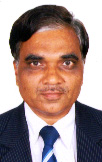 |
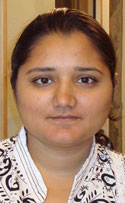 |
| Jashbhai B. Prajapati and Ami Patel, EMECW scholarship holders from Anand Agricultural University. | |
A large number of Indian students, PhD candidates, post-docs and academic staff has come to Lund University during the academic year 2009-10, as scholarship holders through the Erasmus Mundus External Cooperation Window mobility programme Lot 15, coordinated by Lund University. This programme was announced in 2008, and out of a total mobility of 320 persons, 53 Indian students, researchers and academic staff were selected to come specically to Lund University. More information about the EMECW programme lot 15 (from 2009 renamed to be one out of four programmes under the mobility lot 13). ![]()
Professor Jashbhai B. Prajapati, Head of the Dairy Microbiology Department, SMC College of Dairy Science at Anand Agricultural University in Gujarat, India, was selected by the EMECW lot 15 consortium to spend two months at the Dept. of Biotechnology, Lund University, as an academic staff. While in Lund, he organises a mini course on Fermented Foods, and is also planning collaborative research projects. Prof. Prajapati is also coordinating activities of SASNET-Fermented Foods, the network of scientists, academicians, professionals, industry personnel and others interested in promoting fermented foods for public health and social well-being. This network was initiated by Prof. Baboo Nair at the Dept. of Applied Nutrition and Food Chemistry, Lund University, with support from SASNET in 2002. More information about the SASNET-Fermented Foods project.
PhD candidate Ami Patel also comes from Anand Agricultural University, and was selected to come to the Dept. of Biotechnology. There she is working with Prof. Olle Holst on the area of exopolysaccharides from lactic acid bacteria. Such exopolysaccharides have great potential for human health as well as improving food characterstics. She will spend 18 months as a scholarship holder at Lund University. Her supervisor in India is Prof. J B Prajapati.
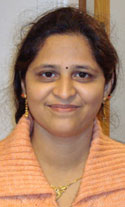 Dr. Sindhu Mathew comes from the National Institute of Interdisciplinary Science and Technology (NIIST) in Thuruvananthapuram, Kerala. As a EMECW scholarship holder, Dr. Mathew worked as a Post Doctoral Fellow at the Dept. of Biotechnology. She completed her PhD in India on the topic “Studies on ferulic acid, a bioactive compound and on feruloyl
esterase involved in its production”. Her current research work focuses on the enzymatic glycosylation of phenolic compounds of biological importance.
Dr. Sindhu Mathew comes from the National Institute of Interdisciplinary Science and Technology (NIIST) in Thuruvananthapuram, Kerala. As a EMECW scholarship holder, Dr. Mathew worked as a Post Doctoral Fellow at the Dept. of Biotechnology. She completed her PhD in India on the topic “Studies on ferulic acid, a bioactive compound and on feruloyl
esterase involved in its production”. Her current research work focuses on the enzymatic glycosylation of phenolic compounds of biological importance.
Dr. Aarti Devendra Ozarkar (photo to the right) comes from the Dept. of Zoology,
University of Pune. She completed her PhD in Biotechnology from University of Pune with a thesis entitled ”Analysis of Genetic Polymorphism of DBLα domain of
Plasmodium falciparum – Malaria Vaccine Candidate Var”. Her research
supervisor was Dr Deepti Dileep Deobagkar.
As a EMECW scholarship holder, Dr. Ozarkar worked as Post Doctoral Fellow at the Dept. of Biotechnology for a period of 10 months 2009-10. Her research supervisor was Prof. Bo Mattiasson.
SASNET - Swedish South Asian Studies Network/Lund
University
Address: Scheelevägen 15 D, SE-223 70 Lund, Sweden
Phone: +46 46 222 73 40
Webmaster: Lars Eklund
Last updated
2011-08-10
